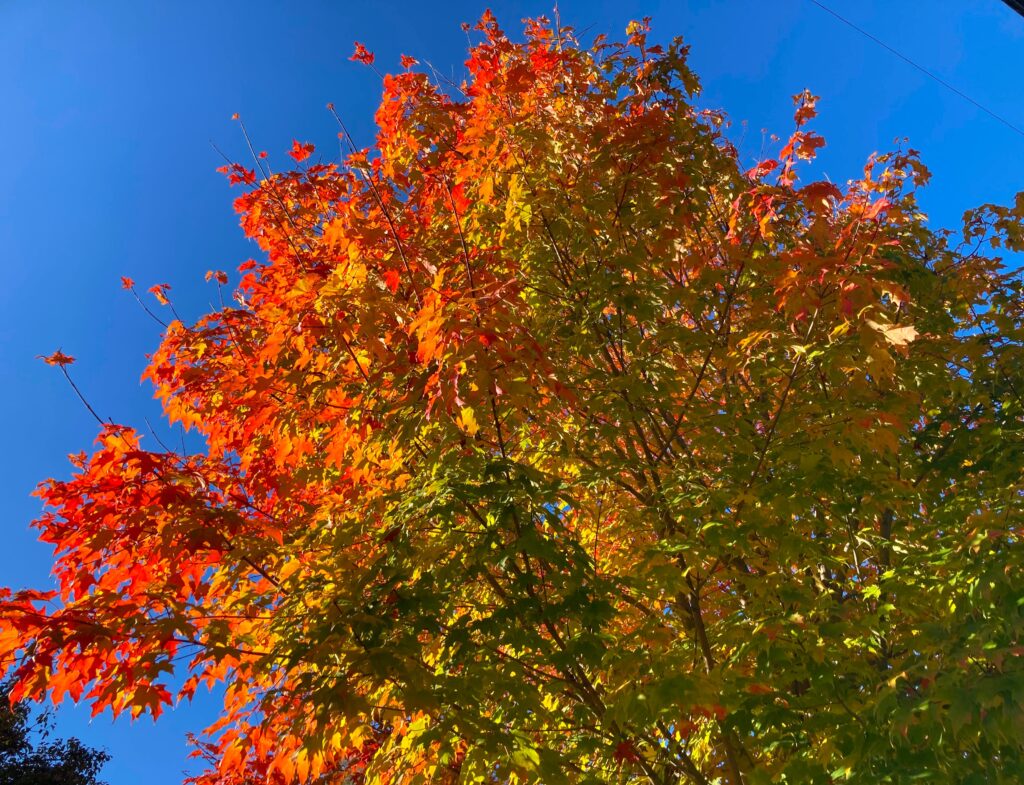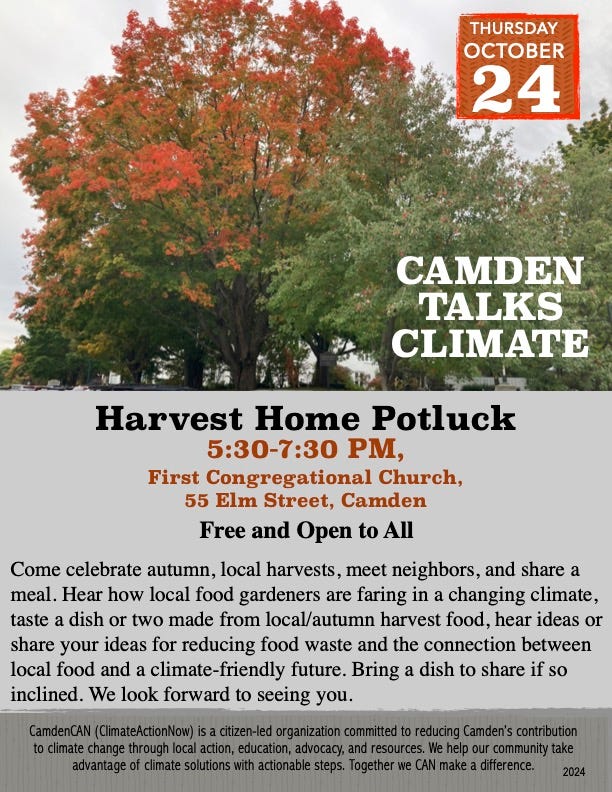Change, Collaboration, and Community — Potluck This Thursday
Oct 22, 2024

Last issue we imagined Camden’s futures. This week we celebrate the bounty at our doorstep.
These light-filled, bright autumn days keep our gardens growing—raspberries, potatoes, squashes, brussel sprouts, and kale. And they remind us that within the warming of the planet there are upsides.
In our thriving future Camden, more of us will become food gardeners, enjoying the benefits of growing, eating, and sharing climate-friendly food. Many of our neighbors have such food gardens now, and we’re hoping their energy and enthusiasm for growing food spreads to more of us who aren’t yet using our plots of land for that purpose. In our future Camden, others won’t grow their own food but will invest more in sourcing it locally. And some will shift to plant-based menus.
One part of our future is certain. We’ll always need to eat. And food—its growth, its transportation, its use, and its waste—plays a major role in our climate’s future. (Listen to “What Should I Eat In a Climate Crisis?” from Outrage and Optimism podcast [with Christiana Figueres] for a succinct roundup of the issues. This article at the Maine Morning Star and this one at the Maine Monitor illuminate the food waste situation in Maine. And Sarah Miller, a Camden neighbor and on our steering committee, penned this look at the troubles with agribusiness that underlies all of this—read her “What I Eat and Why It Matters.” )
We hope, no matter what your current relationship is to food and its many impacts, that you join us at the Harvest Home Potluck on Thursday, October 24, to share in this autumn’s bounty, which includes not just food, but the people with whom we share this corner of the world. (Details below.)
Neighborhood Bonds Help Camden Build Resilience
As the planet continues to warm—which it will, until we curtail our burning of fossil fuels—we’re going to need one another more than ever. Connecting in multiple new ways with the folks we live amongst is vital to building climate resilience.
For one thing, neighbors are uplifting—it feels good sharing a smile and exchanging hellos as we rake our leaves and walk our dogs. Exchanging and borrowing tools means we have to make fewer goods and spend less. Offering to help hoist a ladder or to pet sit fosters an exchange economy that’s easy and flexible. Waving hellos across fence lines sends a little shot of sunshine into a dark day.
For another thing, we need one another. Neighbors pay town taxes, grow families, make up the school and select boards, manage homes, stack the books at our beloved library, own and work at our local shops and restaurants.
All of us who live in Camden share at least one common value with all our neighbors: We chose to live here, at the edge of the sea, where mountains and forests provide bountiful fresh air and a wide seascape.
What other values do we share? Perhaps you and a neighbor both love the offerings at the Opera House or the breadth of the collection at the library. Or one is a member of the local rotary devoted to community service and another belongs to a community choir. There are literally dozens of locals groups and organizations to which we belong, with shared passions and values.
In these fraught days, there are also topics and issues on which we don’t agree: the choice for the next president or state senator; the conundrum posed by decaying infrastructure on our beloved river watershed; the solutions for rising sea-level inundation of our harbor-side public properties; the appropriate ways to transition our town-owned ski area to a four-season recreation area without the snowy winters of yore.
Yet, we can imagine ways to listen and work together, collaborating with respect on these topics. We can imagine regular, community-wide meals at our waterfront, at our mountains, at our churches, and community centers. We can imagine fruitful discussions and learning sessions about the rivers, the harbor, the town-owned facilities.
We’ll get to lasting solutions when we grow to trust one another as caring and thoughtful neighbors. We hope to meet more of you and develop more of that trust at the potluck on Thursday.
(Read this commentary on rebuilding civil discourse for more on this topic.)
Harbor Resilience Workshop Recap—and Survey Link
We had nearly 100 folks participate in last week’s Camden Harbor Resilience Workshop. State geologist Pete Slovinsky reviewed the current predictions and policies on sea-level rise: commit to manage 1.5 feet rise by 2050 and 3.9 feet by 2100. And he reviewed the FEMA flood maps for the harbor area, which have proved to be remarkably accurate.
Slovinsky also spoke about additional challenges for peak storm surge, and king tides (whose frequency has gone up from 4/year to 13 events/year since 2010). He talked about the benefits of using natural solutions—plantings, organic berm materials—for areas under continuous flooding: they help strengthen the substrate while minimizing damage to nearby properties, whereas hard structures like walls and jetties move the problem elsewhere instead of solving it. He also gave the five possible approaches to sea level rise/storm surge/king tides:
- do nothing;
- avoid;
- accommodate and adapt (let the area be “floodable”);
- protect (nature-based solutions; hybrid engineering solutions);
- relocate or remove.
The team from Richardson & Associates/WSP offered a visual tour of the harbor areas affected, and reiterated that the process of planning is proactive and community driven, with the ultimate goal being to create a flood-resilient waterfront that meets multiple community needs and interests.
Ensuring that solutions work with rather than against nature—allowing all the ecosystems at the water’s edge to thrive—is critical to achieving that overarching goal. Speakers stressed that gray/hard solutions are most effective the first year after they’re built, while green/nature-based solutions (“living shorelands”) grow in effectiveness as the years, and storms, go by—strengthening as nature does her work.
You can review the slides from the evening here. (You can watch the end of the video here—unfortunately the full video is not available.)
The next Camden Harbor Resilience Workshop will include hands-on community input. In order to plan for that, Richardson & Associates need as many of us as possible to complete this questionnaire by 10/29.
Upcoming Climate-Related Events
10/24/24, Thursday, 5:30-7:30 pm, First Congregational Church of Camden, 55 Elm Street, Harvest Home Potluck sponsored by CamdenCAN. There will be plenty to talk about as we gather: the summer’s growing season, opportunities to expand one’s cooking skills (and reduce global warming) with a plant-based diet, and the role of food-waste in our warming world. (According to Maine Morning Star: “Annual food waste in Maine emits as much greenhouse gas as nearly 400,000 cars,” [Annemarie Hilton, 10/15/24].) You’ll meet neighbors you didn’t know you had and learn of resources for seed-sharing, composting, gleaning, and home food gardening. If you’re so inclined, bring a dish to share, and/or a recipe for plant-based food, if you have a favorite. We’ll be building stronger community bonds, helping one another embrace lower-impact lifestyles, and sharing good cheer and wholesome food. Event is free and open to all, and family-friendly.
10/26/24, Saturday, 4:30 pm, 22 Mountain View Drive, Rockland. Service of Lament, presented by The First Congregational Church Creation Care Action Group. Join a campfire circle to lament losses in our biosphere, followed by a service of fellowship and community. FMI contact ute@camdenucc.org
Concluding Thoughts
As I write this the air temperature is 20 degrees above the average daily high for this late October day. It is lovely. It is disconcerting. It is what we have. Now.
As we keep burning fossil fuels this might be the coolest October in our warming future…Next year will we have an even warmer autumn?
Warmer than this October? It’s possible.
Shifts in eating habits can reduce fossil fuel consumption. Sourcing food locally is one big step—maybe items grown across the world become a treat instead of a staple.
There are so many actions, small and large, that would create a thriving future Camden. Let’s talk about them. And share a meal.

